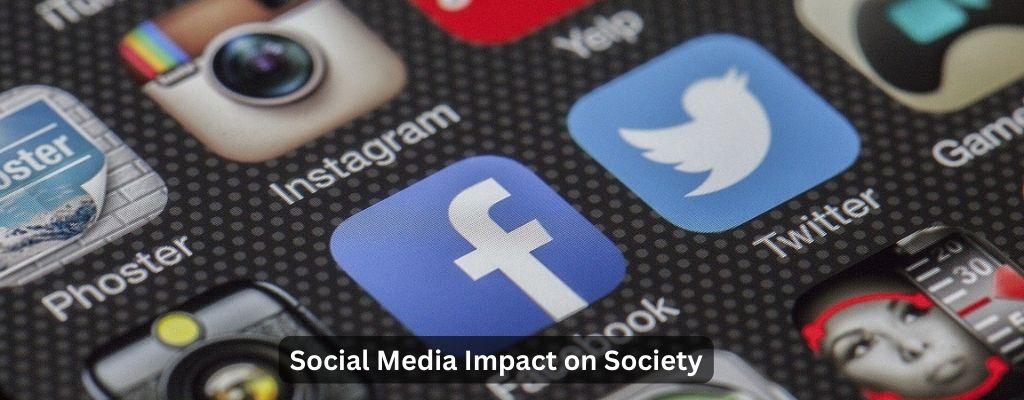
Social media impact on society is profound, shaping how we communicate, share information, and interact with one another in both positive and negative ways. Social media has become an integral part of modern society, transforming the way we communicate, interact, and share information. Platforms like Facebook, Twitter, Instagram, and more have rapidly evolved over the past two decades, connecting people from all corners of the globe. While social media offers numerous benefits, it also wields significant influence, both positive and negative, on our society. This article explores the multifaceted impact of social media on individuals, relationships, politics, and mental health, shedding light on the complex relationship between technology and society.
I. The Rise of Social Media
The advent of social media marked a paradigm shift in how we connect and communicate. It all began with platforms like Friendster and MySpace but truly exploded with the emergence of Facebook in 2004. The subsequent growth and diversification of social media platforms reshaped society’s interactions. Today, billions of people use social media to share their thoughts, photos, and experiences. These platforms offer a sense of belonging, allowing people to connect with friends, family, and like-minded individuals worldwide.
II. Positive Influence on Society
- Enhanced Communication: Social media bridges geographical gaps, enabling friends and family separated by distance to stay in touch. It fosters real-time communication and supports long-distance relationships.
- Information Dissemination: Social media has democratized information sharing. It’s a platform for news, educational content, and awareness campaigns. Information travels faster and reaches a wider audience through social media.
- Social Activism: Movements like the Arab Spring, #BlackLivesMatter, and #MeToo have harnessed the power of social media to raise awareness and promote social change. It enables collective action and amplifies the voices of marginalized communities.
- Networking and Business: Social media serves as a professional networking tool, facilitating career growth and entrepreneurship. Businesses leverage platforms like LinkedIn to connect with potential clients and employees.
- Global Perspective: Social media exposes users to diverse cultures and viewpoints, broadening their horizons and promoting empathy. It also helps in disaster relief efforts by connecting aid organizations with affected communities.
III. Negative Influence on Society
- Privacy Concerns: The pervasive nature of social media raises concerns about user privacy. Data breaches and misuse of personal information have become increasingly common.
- Mental Health Issues: The constant exposure to curated, idealized lives on social media can lead to feelings of inadequacy and depression, particularly among young users. The fear of missing out (FOMO) is a prevalent issue.
- Cyberbullying: Social media provides a platform for bullying and harassment, often leading to serious consequences, including self-harm and suicide among victims.
- Echo Chambers: Users often engage with like-minded individuals, reinforcing existing beliefs and creating echo chambers. This can polarize society and hinder constructive dialogue.
- Disinformation and Fake News: Social media can be a breeding ground for the spread of false information, which can have real-world consequences, such as influencing elections and public opinion.
IV. Influence on Relationships
- Positive Impacts on Relationships: Social media can help maintain long-distance relationships, reconnect with old friends, and support communication in couples. It provides a platform for sharing memories and experiences.
- Negative Impacts on Relationships: Overuse of social media can lead to relationship conflicts and jealousy. The addictive nature of these platforms can divert attention from real-world relationships.
- Digital Footprint: People often judge potential partners or friends based on their social media presence. It can lead to misunderstandings and misconceptions.
V. Influence on Politics
- Political Activism: Social media has given a voice to marginalized groups and played a pivotal role in various political movements. It enables rapid organization and mobilization.
- Political Polarization: On the flip side, social media impact on society can contribute to political polarization as users are exposed to information that confirms their pre-existing beliefs. This can lead to increased ideological divisions in society.
- Fake News and Disinformation: The spread of fake news on social media has the potential to sway elections and influence public opinion. It has raised questions about the responsibility of tech companies to combat this issue.
VI. Influence on Mental Health
- Social Comparison: People often compare themselves to others on social media, leading to feelings of inadequacy and low self-esteem.
- Cyberbullying: Online harassment and bullying can have severe consequences for mental health, especially among young people.
- Addiction: The design of social media platforms is intentionally addictive, leading to excessive use, which can harm mental well-being.
- Isolation and Loneliness: Paradoxically, excessive use of social media can lead to feelings of isolation and loneliness, as real-world relationships may suffer.
VII. Regulation and Responsibility
- Content Moderation: Social media platforms are increasingly under pressure to moderate content and combat issues like hate speech and disinformation. Balancing free speech and responsible content moderation is a complex challenge.
- Privacy Protections: Data privacy regulations, such as GDPR in Europe, have been implemented to protect user data. More comprehensive privacy measures are being debated globally.
- Media Literacy: Promoting media literacy is essential to help users critically evaluate the information they encounter on social media.
VIII. The Future of Social Media
As technology continues to advance, the social media impact on society will likely evolve. The integration of virtual reality, augmented reality, and artificial intelligence in social media platforms impact on society will present new challenges and opportunities. Understanding the social, ethical, and psychological implications of these technologies is crucial as society adapts to these changes.
Conclusion (Social Media Impact on Society)
Social media impact on society is profound and multifaceted. It has transformed the way we communicate, interact, and access information. While there are numerous positive aspects, such as enhanced communication, information dissemination, and social activism, there are also significant challenges, including privacy concerns, mental health issues, and the spread of disinformation. As society continues to grapple with the influence of social media, it is essential to strike a balance between its benefits and drawbacks, and to promote responsible use and regulation. Only then can we harness the full potential of social media as a force for positive change in our rapidly evolving world.

